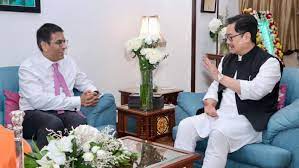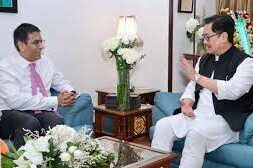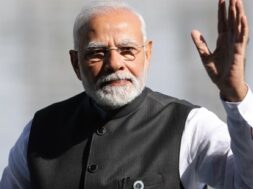
Manas Dasgupta
NEW DELHI, Nov 20: Even as the Chief Justice of India (CJI) Dhananjaya Y Chandrachud has agreed to list “in due course of time” a Public Interest Litigation seeking revival of the “National Judicial Appointment Commission” (NJAC) to replace the current Collegium System, he personally favoured the existing system.
In the presence of the union law minister Kiren Rijuju, who strongly batted for the NJAC where the government would have some say in the judicial appointments, CJI Chandrachud on Saturday said the collegium system take administrative decisions in the “national perspective.”
A debate is currently on over the efficacy of the two judicial appointment system particularly after Rijuju strongly denounced the collegium system stating that it was not opaque while the former CJIs UU Lalit and before him NV Ramana had found the collegium system to be more effective and quicker to deliver.
Chandrachud, who had agreed to meet lawyers of the Gujarat High Court striking over a judge’s transfer recommended by the collegium headed by him, on Saturday said the strike makes “consumers of justice suffer.” Speaking at the felicitation function organised by the Bar Council of India (BCI), he backed the collegium system of judicial appointments, saying it takes administrative decisions keeping in view the “national perspective.”
Union Law Minister Kiren Rijiju, who was also present at the event, criticised protesting lawyers for seeking to meet the CJI over the transfer case. “It can be an individual issue but if it becomes a recurring instance for every decision by the collegium, which is supported by the government, then where will it lead to? The whole dimension will change,” he said.
The process of the appointment of judges to the Supreme Court and High Courts has been under question for long, with some expressing reservations about it not being transparent as the judges decide among themselves. Kiren Rijiju had earlier said the collegium system needs to be reconsidered.
The government’s role in the process is minimal, limited only to getting an inquiry conducted by the Intelligence Bureau (IB) if a lawyer is to be elevated as a judge in a High Court or the Supreme Court. The government can also raise objections and seek clarifications regarding the collegium’s choices, but if the collegium reiterates the same names, the government is bound, under Constitution Bench judgments, to appoint them as judges.
There have been instances when the government, unhappy with certain recommendations, has delayed appointments. This has been a flashpoint between the centre and the judiciary, which has struggled to fill vacancies even in the Supreme Court. Under the NJAC system the government has two representatives in the six-member commission to decide on the judicial appointments.
Justice Chandrachud was elevated to the top judicial post last week, and headed his first collegium meeting on November 16 where he decided to transfer three high court judges — one each from Madras, Gujarat, and Telangana — for administrative reasons.
The five-member collegium recommended shifting the Madras High Court Acting Chief Justice T Raja to the Rajasthan High Court, while Justice Nikhil S Kariel and Justice A Abhishek Reddy have been proposed to be transferred to the Patna High Court.
Justice Raja was appointed as Additional Judge of Madras High Court on March 31, 2009 and assumed charge as Acting Chief Justice from September 22, 2022. Justice Nikhil S Kariel is currently a judge at the Gujarat high court, while Justice A Abhishek Reddy is posted at Telangana high court.
Lawyers have been up in arms since, and went on a strike. The CJI has agreed to meet a delegation from the Gujarat bar to discuss the transfer proposal. The Law Minister said such frequent confrontations are worrying, and all parties must decide what’s good for the institution.
“When I saw lawyers going for the protest…I heard some information that some lawyers are going for some strike on some issues. And in the days to come, these are some of the things which we may see more frequently. We have to think, and we have to decide whether this will be good for the institution,” Mr Rijuju added.
Gujarat Bar representatives are expected to meet the CJI on Monday over the proposed transfer of Gujarat High Court judge Nikhil Kariel. Chandrachud on November 9 became the 50th Chief Justice of India. He will have a tenure till November 10, 2024. He succeeded Chief Justice UU Lalit, who retired on November 9.













